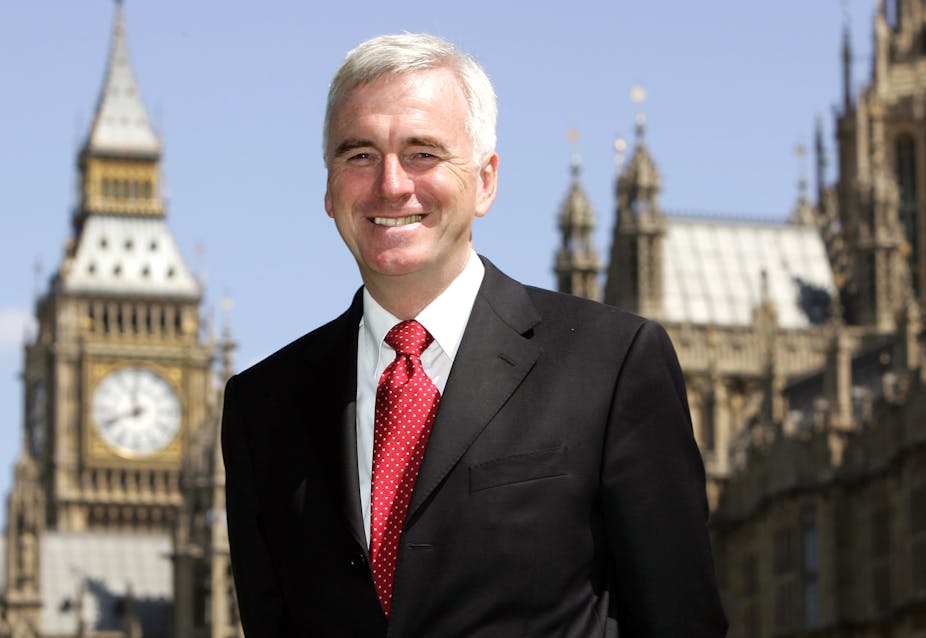Britain’s new shadow chancellor, John McDonnell, has an intriguing political history. He’s a radical who can find common ground with conservatives, and a “big spender” who balanced Greater London’s budget without big tax increases. This makes it unwise to judge his economic plans on past pronouncements.
Some critics have already presented his inclination to nationalise banks and utilities and override the Bank of England’s independence as a danger to the treasury.
But the world will have changed by 2020, in ways that could make his more radical ambitions either unachievable or indispensable. Here are four factors that could make or break John McDonnell should he make it into No 11 Downing Street.
Another down-cycle
At present the Office for Budget Responsibility is forecasting steady 2.4 percent economic growth from 2017 to 2020 and few independent analysts expect the upturn to be interrupted. But the models that deliver these forecasts rarely identify the turning-points at which investment grinds to a halt and production starts falling again.
Given that the UK has averaged a recession every eight and a half years in the 60 years after 1945, and every seven and a half years until the fatally long boom of 1991-2008, it would be unusual if George Osborne finishes his chancellorship without one.
The UK’s heavy reliance on private sector credit expansion and an approaching combination of rising US interest rates, a fragile eurozone recovery, stalling of Chinese growth and its contagion to other fast-growing economies all mean that many who’ve got money in the game are already expecting another downturn.
This would undermine Osborne’s already difficult path to closing the deficit, leaving his successor a public sector that’s already borrowing for current consumption as well as investment.
A stumbling recovery would broaden the appeal of McDonnell’s anti-austerity strategy, but narrow his scope for pursuing it. Tax increases on corporations and high incomes are less certain to raise extra revenue when business stops expanding, and could worsen the downturn unless there are at least equivalent spending increases, widening the deficit again. Financing this with extra borrowing will get harder when interest rates start to rise, with public debt already at a 50-year high.

Meanwhile, “printing money”, as an alternative to borrowing, would depend on extending a quantitative easing programme already under fire for worsening inequality and rewarding the 1%, in a way the Bank of England openly opposes. The UK’s current account deficit leaves it chronically dependent on capital inflows, limiting the extent to which any Chancellor can afford to alienate the City or cajole the central bank.
Brexit
The new Labour leader’s lukewarm commitment to EU membership adds to the possibility that the UK will vote itself out in the referendum due by 2017. The cross-party loss of enthusiasm for the EU reflects a widespread belief that a Brexit would make life easier for the next chancellor. The idea is that it would make the UK’s “net contribution” available for domestic use, allowing additional spending on infrastructure and skills to be more closely targeted at British companies and workers.

But the UK might find EU markets for goods, services, labour and capital harder to access outside the EU. Plus, the stability of its own internal market would be at risk if Scotland reacted with another referendum, which has been mooted.
Immigration boom
Corbyn has taken the principled stance of accepting more migrants from the EU, despite needing to recapture votes from a UKIP that argues the opposite. Most economic studies find that immigration boosts output and employment creation in the longer term. Indeed, there are even cynics who view Germany’s open-door policy towards fleeing Syrians as fuelled more by economic growth needs than humanitarian values.

But the scale of immigration to Europe is now more than sufficient to offset its natural population decline. A new chancellor who pledges more affordable housing will need quick fixes for an already acute shortage of homes and school places before the long-term benefits of a larger, well-motivated population start to arrive.
Energy crunch
Some on Labour’s left cheered when the lights flickered during the 1984-85 miners’ strike, whose success depended on stopping power stations’ coal supply. But now a similar prospect has resurfaced due to the running-down of old nuclear power stations and slow progress on building new ones, as well as EU emissions curbs which cannot be met without a rapid end to coal-fired generation.

The government is already seeking a stay-of-execution for coal, which might be easier after a Brexit. But Corbyn’s quest to recapture Green votes has left him keen to respect the emissions curbs and dubious on the UK’s nuclear future. The UK’s capacity margin is already too small to make cold winters comfortable, and the time large power-stations take to build could leave a future chancellor without the energy for faster production or employment growth.
Polarising choice
McDonnell is a polarising choice in one powerful sense. His chances of becoming (and succeeding as) chancellor are greatest if the present government leaves an economic legacy so golden as to make more tax-and-spend easily affordable, or so leaden as to make a Keynesian spend-without-tax plan unavoidable.
The last Labour chancellor to inherit the leaden scenario was probably Denis Healey, who found himself saving capitalism from the aftermath of an oil shock rather than “generally fomenting” its overthrow. Healey’s long intellectual and political journey counsels against dismissing McDonnell as a future occupant of 11 Downing Street. But his path there could be strewn with similarly dire economic events.

